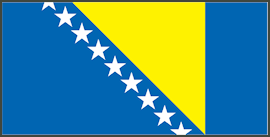Bosnia and Herzegovina (BiH)
 In December 1995, NATO deployed a 60,000-troop Implementation Force (IFOR) to oversee implementation of the military aspects of the peace agreement. IFOR transitioned into a smaller Stabilization Force (SFOR) in 1996. With the end of the SFOR mission in December 2004, the European Union (EU) assumed primary responsibility for military stabilization operations. Approximately 2,000 EU troops remain deployed in Bosnia. NATO maintains a small headquarters operation with responsibility to assist with defense reform and efforts against persons indicted for war crimes and counterterrorism.
In December 1995, NATO deployed a 60,000-troop Implementation Force (IFOR) to oversee implementation of the military aspects of the peace agreement. IFOR transitioned into a smaller Stabilization Force (SFOR) in 1996. With the end of the SFOR mission in December 2004, the European Union (EU) assumed primary responsibility for military stabilization operations. Approximately 2,000 EU troops remain deployed in Bosnia. NATO maintains a small headquarters operation with responsibility to assist with defense reform and efforts against persons indicted for war crimes and counterterrorism.
The international community retains an extraordinary civilian and military presence in Bosnia and Herzegovina (BiH) stemming from the Dayton Peace Accords. The Dayton Accords created the position of High Representative, an international official charged with overseeing implementation of the civilian aspects of the agreement.
When the war ended in 1995, the Dayton Peace Accord stipulated that foreign policy would be a prerogative of the state, as opposed to Bosnia and Herzegovina's two entities. Powers to appoint ambassadors and outline foreign policy strategy were, therefore, awarded to the tripartite Presidency, composed of one Serb, one Muslim and one Croat. The law extends significant overlapping law enforcement competencies to the state-level government, to each entity, and the Brcko District, each of which has its own police force. A 2,000-person EU force continued to implement the military aspects of the Dayton Accords. The North Atlantic Treaty Organization oversees defense reform, counterterrorism, and cooperation with the ICTY. The EU Police Mission remained in the country, tasked with the mission to monitor aspects of the work of the local police.
In July 2001, the Presidency of Bosnia and Herzegovina formally expressed Bosnia and Herzegovina's readiness to accept its obligations and rights in the family of Euro-Atlantic nations, and to contribute actively to collective security. The Presidency also expressed Bosnia and Herzegovina's commitment to integration into Euro-Atlantic structures, to the Partnership for Peace programme, and to the implementation of defence reforms including restructuring of the Armed Forces. Over the past three years, working in the context of these objectives, we have striven to create a suitable environment for defence reform, to achieve internal stability, and to become a credible candidate for the Partnership for Peace program.
The defence reform process began in 2003 with the establishment of the Defence Reform Commission, proceeding through the work of the Commission and culminating with the publication of the Commission's report. The aim was to establish a common defence system, taking into account the security environment and economic realities. As a result of this process, significant changes have been made to the structure and the functioning of the Bosnia and Herzegovina defence system.
The primary objective of the defence reform process was the establishment and strengthening of State-level institutions which could function as the supreme authority in defence-related issues. Consequently, activities have focused on increasing the authority of the Presidency of Bosnia and Herzegovina as the supreme commander of the Armed Forces of Bosnia and Herzegovina, expanding the role the Parliamentary Assembly of Bosnia and Herzegovina in order to exercise effective democratic control over the Armed Forces of Bosnia and Herzegovina, and establishing State-level defence institutions capable of supporting the Presidency in exercising command and control over the Armed Forces of Bosnia and Herzegovina.
The country's basic foreign policy guidelines are governed by the Foreign Policy General Guidelines and Priorities, a document that the three-member Presidency adopted in March 2003. According to this platform, the country's top foreign policy priority is defined as Euro-Atlantic integration.
Amendments to the entity constitutions and the adoption of new laws during 2003 and 2004 made possible the creation of a common defence establishment in Bosnia and Herzegovina, with an appropriate division of responsibilities between the State and the entities, mechanisms that will provide for efficient command and control of the Armed Forces of Bosnia and Herzegovina, and improvements in military interoperability, democratic oversight and transparency. The establishment of the Bosnia and Herzegovina Ministry of Defence, Joint Staff and Operational Command is the most evident result of defence reform, as these institutions shall contribute directly to the operational capability and functioning of the Armed Forces of Bosnia and Herzegovina and enable Bosnia and Herzegovina's participation in programmes such as the Partnership for Peace.
|
NEWSLETTER
|
| Join the GlobalSecurity.org mailing list |
|
|
|

